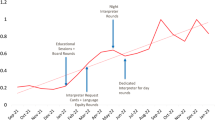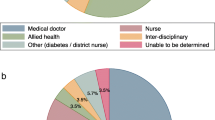Abstract
Patients with limited English-proficiency (LEP) who need but do not receive interpreters have lower satisfaction and poorer understanding. A knowledge gap remains regarding the optimal way to offer interpreters. Using standardized scripts, we will determine whether the questions we use to offer interpreters increase utilization. Pilot prospective cohort study of postpartum mothers with LEP. Subjects were assigned one of three unique scripted question offering an interpreter. Data were analyzed using ANOVA, chi-square test, and Fisher’s exact test. Fifty-five LEP patients were randomized into three study arms with similar sociodemographics. Overall interpreter use was 80% (44/55). There was a significant difference in interpreter utilization: 82.4%, 63.6%, 100%, respectively by arm (p = 0.015). Highest interpreter utilization occurred with “In what language do you prefer to receive your medical care?”. There is opportunity for providers to refine the way they offer interpreters to optimize utilization.
Similar content being viewed by others
References
Commonly asked questions and answers regarding limited English proficient (LEP) individuals. U.S. Department of Justice; 2011. https://www.lep.gov/faq/faqs-rights-lep-individuals/commonly-asked-questions-and-answers-regarding-limited-english. Accessed 5 May 2020.
Samuels-Kalow ME, Stack AM, Porter SC. Parental language and dosing errors after discharge from the pediatric emergency department. Pediatr Emerg Care. 2013;29(9):982–7.
Jacobs EA. Patient centeredness in medical encounters requiring an interpreter. Am J Med. 2000;109(6):515.
Divi C, Koss RG, Schmaltz SP, Loeb JM. Language proficiency and adverse events in US hospitals: a pilot study. Int J Qual Health Care. 2007;19(2):60–7.
Flores G. The impact of medical interpreter services on the quality of health care: a systematic review. Med Care Res Rev. 2005;62(3):255–99.
Hampers LC, McNulty JE. Professional interpreters and bilingual physicians in a pediatric emergency department: effect on resource utilization. Arch Pediatr Adolesc Med. 2002;156(11):1108–13.
Baker DW, Hayes R, Fortier JP. Interpreter use and satisfaction with interpersonal aspects of care for Spanish-speaking patients. Med Care. 1998;36(10):1461–70.
Lion KC, Mangione-Smith R, Martyn M, Hencz P, Fernandez J, Tamura G. Comprehension on family-centered rounds for limited English proficient families. Acad Pediatr. 2013;13(3):236–42.
Jacobs EA, Lauderdale DS, Meltzer D, Shorey JM, Levinson W, Thisted RA. Impact of interpreter services on delivery of health care to limited-English-proficient patients. J Gen Intern Med. 2001;16(7):468–74.
Juckett G, Unger K. Appropriate use of medical interpreters. Am Fam Phys. 2014;90(7):476–80.
Language use. U.S. Department of Commerce: US Census Bureau. https://www.census.gov/topics/population/language-use/about.html. Accessed 5 May 2020.
US Census Bureau. Detailed languages spoken at home and ability to speak English for the population 5 years and over: 2009–2013. New York: US Census Bureau; 2015.
Schenker Y, Perez-Stable EJ, Nickleach D, Karliner LS. Patterns of interpreter use for hospitalized patients with limited English proficiency. J Gen Intern Med. 2011;26(7):712–7.
Karliner LS, Napoles-Springer AM, Schillinger D, Bibbins-Domingo K, Perez-Stable EJ. Identification of limited English proficient patients in clinical care. J Gen Intern Med. 2008;23(10):1555–60.
López L, Rodriguez F, Huerta D, Soukup J, Hicks L. Use of interpreters by physicians for hospitalized limited English proficient patients and its impact on patient outcomes. J Gen Intern Med. 2015;30(6):783–9.
Yeheskel A, Rawal S. Exploring the “patient experience” of individuals with limited english proficiency: a scoping review. J Immigr Minor Health. 2019;21(4):853–78.
Flores G, Abreu M, Barone CP, Bachur R, Lin H. Errors of medical interpretation and their potential clinical consequences: a comparison of professional versus ad hoc versus no interpreters. Ann Emerg Med. 2012;60(5):545–53.
Boscolo-Hightower A, Rafton SA, Tolman M, Zhou C, Ebel BE. Identifying families with limited English proficiency using a capture-recapture approach. Hosp Pediatr. 2014;4(1):16–22.
Okrainec K, Miller M, Holcroft C, Boivin JF, Greenaway C. Assessing the need for a medical interpreter: are all questions created equal? J Immigr Minor Health. 2014;16(4):756–60.
Hartford EA, Anderson AP, Klein EJ, Caglar D, Carlin K, Lion KC. The use and impact of professional interpretation in a Pediatric Emergency Department. Acad Pediatr. 2019;19(8):956–62.
Taira BR, Orue A. Language assistance for limited English proficiency patients in a public ED: determining the unmet need. BMC Health Serv Res. 2019;19(1):56.
Burbano O’Leary SC, Federico S, Hampers LC. The truth about language barriers: one residency program’s experience. Pediatrics. 2003;111(5 Pt 1):e569–73.
Schwei RJ, Schroeder M, Ejebe I, Lor M, Park L, Xiong P, et al. Limited English proficient patients’ perceptions of when interpreters are needed and how the decision to utilize interpreters is made. Health Commun. 2018;33(12):1503–8.
Acknowledgements
Talwalkar Grant was awarded during the study period to Devlynne S. Ondusko and Ladawna Gievers.
Author information
Authors and Affiliations
Corresponding author
Additional information
Publisher's Note
Springer Nature remains neutral with regard to jurisdictional claims in published maps and institutional affiliations.
Rights and permissions
About this article
Cite this article
Ondusko, D.S., Khaki, S., Huun, C. et al. Do Standardized Scripts Improve Interpreter Use by Spanish-Speaking Patients?. J Immigrant Minority Health 23, 1021–1025 (2021). https://doi.org/10.1007/s10903-021-01195-7
Accepted:
Published:
Issue Date:
DOI: https://doi.org/10.1007/s10903-021-01195-7




